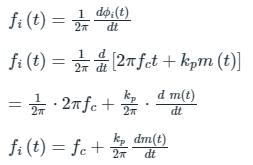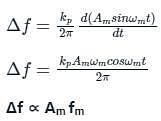Electronics and Communication Engineering (ECE) Exam > Electronics and Communication Engineering (ECE) Questions > In phase modulated signal, the frequency devi...
Start Learning for Free
In phase modulated signal, the frequency deviation is proportional to
- a)Frequency only
- b)Amplitude only
- c)Both (1) and (2)
- d)none of the above
Correct answer is option 'C'. Can you explain this answer?
| FREE This question is part of | Download PDF Attempt this Test |
Most Upvoted Answer
In phase modulated signal, the frequency deviation is proportional toa...
Frequency deviation in phase modulated signal is proportional to both frequency and amplitude.
Explanation:
Phase modulation (PM) is a modulation technique where the phase of the carrier signal is varied in accordance with the modulating signal. In PM, the phase shift of the carrier signal is directly proportional to the instantaneous amplitude of the modulating signal.
1. Frequency deviation:
Frequency deviation refers to the change in frequency of the carrier signal due to modulation. In phase modulation, the frequency deviation is directly related to the rate of change of phase with respect to time.
2. Relationship with frequency:
The frequency of the modulating signal determines the rate at which the phase of the carrier signal changes. A higher frequency modulating signal will cause a faster change in phase, resulting in a larger frequency deviation.
3. Relationship with amplitude:
The amplitude of the modulating signal determines the amount of phase shift applied to the carrier signal. A higher amplitude modulating signal will cause a larger phase shift, resulting in a larger frequency deviation.
4. Proportional relationship:
Since both the frequency and amplitude of the modulating signal affect the phase modulation, the frequency deviation is proportional to both factors. This means that an increase in either the frequency or amplitude of the modulating signal will result in a corresponding increase in the frequency deviation.
Conclusion:
In phase modulated signals, the frequency deviation is directly proportional to both the frequency and amplitude of the modulating signal. This relationship is important to consider when designing and analyzing phase modulation systems, as it determines the bandwidth and signal characteristics of the modulated signal.
Explanation:
Phase modulation (PM) is a modulation technique where the phase of the carrier signal is varied in accordance with the modulating signal. In PM, the phase shift of the carrier signal is directly proportional to the instantaneous amplitude of the modulating signal.
1. Frequency deviation:
Frequency deviation refers to the change in frequency of the carrier signal due to modulation. In phase modulation, the frequency deviation is directly related to the rate of change of phase with respect to time.
2. Relationship with frequency:
The frequency of the modulating signal determines the rate at which the phase of the carrier signal changes. A higher frequency modulating signal will cause a faster change in phase, resulting in a larger frequency deviation.
3. Relationship with amplitude:
The amplitude of the modulating signal determines the amount of phase shift applied to the carrier signal. A higher amplitude modulating signal will cause a larger phase shift, resulting in a larger frequency deviation.
4. Proportional relationship:
Since both the frequency and amplitude of the modulating signal affect the phase modulation, the frequency deviation is proportional to both factors. This means that an increase in either the frequency or amplitude of the modulating signal will result in a corresponding increase in the frequency deviation.
Conclusion:
In phase modulated signals, the frequency deviation is directly proportional to both the frequency and amplitude of the modulating signal. This relationship is important to consider when designing and analyzing phase modulation systems, as it determines the bandwidth and signal characteristics of the modulated signal.
Free Test
FREE
| Start Free Test |
Community Answer
In phase modulated signal, the frequency deviation is proportional toa...
The frequency deviation in a phase-modulated carrier is proportional to the amplitude and frequency of the modulating signal both.
Derivation:
A general expression for a phase-modulated wave is:
xPM (t) = A cos [2πfct + kpm(t)]
The instantaneous angle is given as:
ϕi(t) = 2πfct + kp m(t)
The instantaneous frequency (in Hz) will be obtained as:

Frequency deviation is given by:

For a single tone modulation:
m(t) = Am sin ωmt
The frequency deviation becomes:

Derivation:
A general expression for a phase-modulated wave is:
xPM (t) = A cos [2πfct + kpm(t)]
The instantaneous angle is given as:
ϕi(t) = 2πfct + kp m(t)
The instantaneous frequency (in Hz) will be obtained as:

Frequency deviation is given by:

For a single tone modulation:
m(t) = Am sin ωmt
The frequency deviation becomes:

Attention Electronics and Communication Engineering (ECE) Students!
To make sure you are not studying endlessly, EduRev has designed Electronics and Communication Engineering (ECE) study material, with Structured Courses, Videos, & Test Series. Plus get personalized analysis, doubt solving and improvement plans to achieve a great score in Electronics and Communication Engineering (ECE).

|
Explore Courses for Electronics and Communication Engineering (ECE) exam
|

|
Similar Electronics and Communication Engineering (ECE) Doubts
In phase modulated signal, the frequency deviation is proportional toa)Frequency onlyb)Amplitude onlyc)Both (1) and (2)d)none of the aboveCorrect answer is option 'C'. Can you explain this answer?
Question Description
In phase modulated signal, the frequency deviation is proportional toa)Frequency onlyb)Amplitude onlyc)Both (1) and (2)d)none of the aboveCorrect answer is option 'C'. Can you explain this answer? for Electronics and Communication Engineering (ECE) 2024 is part of Electronics and Communication Engineering (ECE) preparation. The Question and answers have been prepared according to the Electronics and Communication Engineering (ECE) exam syllabus. Information about In phase modulated signal, the frequency deviation is proportional toa)Frequency onlyb)Amplitude onlyc)Both (1) and (2)d)none of the aboveCorrect answer is option 'C'. Can you explain this answer? covers all topics & solutions for Electronics and Communication Engineering (ECE) 2024 Exam. Find important definitions, questions, meanings, examples, exercises and tests below for In phase modulated signal, the frequency deviation is proportional toa)Frequency onlyb)Amplitude onlyc)Both (1) and (2)d)none of the aboveCorrect answer is option 'C'. Can you explain this answer?.
In phase modulated signal, the frequency deviation is proportional toa)Frequency onlyb)Amplitude onlyc)Both (1) and (2)d)none of the aboveCorrect answer is option 'C'. Can you explain this answer? for Electronics and Communication Engineering (ECE) 2024 is part of Electronics and Communication Engineering (ECE) preparation. The Question and answers have been prepared according to the Electronics and Communication Engineering (ECE) exam syllabus. Information about In phase modulated signal, the frequency deviation is proportional toa)Frequency onlyb)Amplitude onlyc)Both (1) and (2)d)none of the aboveCorrect answer is option 'C'. Can you explain this answer? covers all topics & solutions for Electronics and Communication Engineering (ECE) 2024 Exam. Find important definitions, questions, meanings, examples, exercises and tests below for In phase modulated signal, the frequency deviation is proportional toa)Frequency onlyb)Amplitude onlyc)Both (1) and (2)d)none of the aboveCorrect answer is option 'C'. Can you explain this answer?.
Solutions for In phase modulated signal, the frequency deviation is proportional toa)Frequency onlyb)Amplitude onlyc)Both (1) and (2)d)none of the aboveCorrect answer is option 'C'. Can you explain this answer? in English & in Hindi are available as part of our courses for Electronics and Communication Engineering (ECE).
Download more important topics, notes, lectures and mock test series for Electronics and Communication Engineering (ECE) Exam by signing up for free.
Here you can find the meaning of In phase modulated signal, the frequency deviation is proportional toa)Frequency onlyb)Amplitude onlyc)Both (1) and (2)d)none of the aboveCorrect answer is option 'C'. Can you explain this answer? defined & explained in the simplest way possible. Besides giving the explanation of
In phase modulated signal, the frequency deviation is proportional toa)Frequency onlyb)Amplitude onlyc)Both (1) and (2)d)none of the aboveCorrect answer is option 'C'. Can you explain this answer?, a detailed solution for In phase modulated signal, the frequency deviation is proportional toa)Frequency onlyb)Amplitude onlyc)Both (1) and (2)d)none of the aboveCorrect answer is option 'C'. Can you explain this answer? has been provided alongside types of In phase modulated signal, the frequency deviation is proportional toa)Frequency onlyb)Amplitude onlyc)Both (1) and (2)d)none of the aboveCorrect answer is option 'C'. Can you explain this answer? theory, EduRev gives you an
ample number of questions to practice In phase modulated signal, the frequency deviation is proportional toa)Frequency onlyb)Amplitude onlyc)Both (1) and (2)d)none of the aboveCorrect answer is option 'C'. Can you explain this answer? tests, examples and also practice Electronics and Communication Engineering (ECE) tests.

|
Explore Courses for Electronics and Communication Engineering (ECE) exam
|

|
Suggested Free Tests
Signup for Free!
Signup to see your scores go up within 7 days! Learn & Practice with 1000+ FREE Notes, Videos & Tests.
























